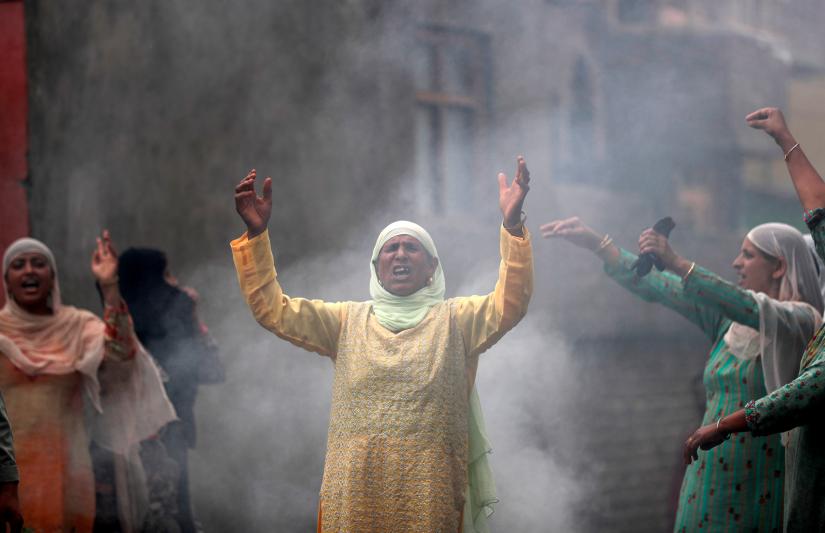 As the world observes the International Day of the Victims of Enforced Disappearances on Aug 30, another hundred or more people will be abducted silently by state security agencies globally.
As the world observes the International Day of the Victims of Enforced Disappearances on Aug 30, another hundred or more people will be abducted silently by state security agencies globally.
Their relatives will hold portraits of disappeared family members and call upon governments to stop such abductions, and seek accountability for the enforced disappearances, killings, and abductions, in Bangladesh, Pakistan, Kashmir, Sri Lanka, Palestine and elsewhere.
Families cry for answers on International Day of the Victims of Enforced Disappearances on August 30, a day declared by the United Nations.
Since its inception in 1980, the UN Working Group on Enforced or Involuntary Disappearances has registered 56,363 cases across 112 countries — but thousands of other cases were simply not reported!
Unfortunately, governments are often reluctant to respond. Besides, security agencies engaged in enforced disappearances, while non-state actors also settle their scores in muddy waters. They enjoy their impunity as they rub shoulders with the mighty in the corridors of power.
The impunity is extended to these forces, often because their crimes against humanity may have had government sanction.
The legal explanation does not, however, convey the horror families endure as they try and grapple with the enforced disappearance of a loved one.
Meenakshi Ganguly, South Asia director of Human Rights Watch says, under international human rights law, an enforced disappearance occurs when a person is taken into custody by government officials or their agents and the state refuses to acknowledge the person’s fate or whereabouts, placing the victim outside the protection of the law.
In South Asia, the recent history of violent conflicts ------ whether the war in Afghanistan; insurgencies in Balochistan, Pakistan or Kashmir, India; the civil war in Sri Lanka and Nepal; or political violence in Bangladesh and the Maldives------ has witnessed serious human rights violations including secret detentions and enforced disappearance, states the New York-based Human Rights Watch.
Bangladesh authorities have traditionally trashed allegations of the disappearances even after the security forces have taken someone away in front of witnesses. Instead, the agencies claim that the ‘disappeared’ are hiding to evade banks loans or are felons dodging arrest.
 In Indian administered Kashmir, they use the shocking word ‘half widow,’ for women whose husbands are missing.
In Indian administered Kashmir, they use the shocking word ‘half widow,’ for women whose husbands are missing.
In Kashmir, hundreds of unidentified foreign jihadists are buried in unmarked graves, but the government is yet to order forensic tests to determine whether the remains of "disappeared" Kashmiris also lie buried in those graveyards.
In Sri Lanka, families of the tens of thousands of people who disappeared during the three-decade-long bitter ethnic civil war are camped in street corner protests. The war ended in 2009, and these families are still hoping that their loved ones will be found.
In Nepal, a Commission of Investigation on Enforced Disappeared Persons received nearly 3,100 complaints but failed to explain the causes and origin of the scary social phenomenon experienced so widely during the country’s ten-year civil war.
The victims experience egregious form of human rights violation, removed from legal protections, remaining at the mercy of their captors, at severe risk of torture or inhumane treatment, and of extrajudicial killings, says Meenakshi Ganguly.
"The families of missing ones spend the rest of their lives waiting for their loved ones to return home, or at least be told where they are buried. This is a severe form of psychological torture," said Leonce Byimana, a psychologist and Executive Director of TASSC, a US-based Torture Abolition and Survivors Support Coalition.
On this International Day of the Victims of Enforced Disappearances, human rights leaders will be speaking on behalf of missing loved ones---- for the Sindhis in Pakistan, the Kurds in the Middle East, the Tamils in Sri Lanka and Uyghur Muslims in China at the National Press Club in Washington DC.
Sufi Laghari, Executive Director of the Washington DC-based Sindhi Foundation also coordinating the Washington Press Club event, said: "We want people to understand how governments carry out enforced disappearances to silence their dissidents."
Until their whereabouts are determined, families of the disappeared should have access to effective remedies and reparations, including regular updates on the status of the investigations. This cruelty needs to stop.
Saleem Samad, is a journalist, recipient of Ashoka Fellow (USA) and Hellman-Hammett Award, also Bangladesh correspondent of Paris based international media rights organization, Reporters Without Borders (RSF). Twitter @saleemsamad; Email: [email protected]


